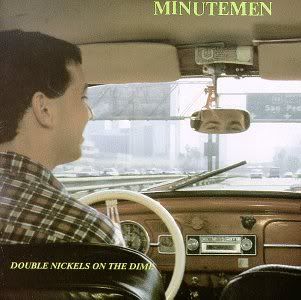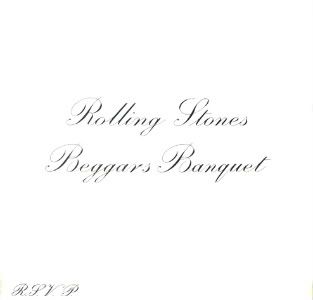
Artist: Minutemen
Album: Double Nickels On The Dime
Label: SST
Year: 1984
Jeez I've been slacking. Been trying to motivate myself to write this thing for a few weeks now! We enter the top 20 with one of the masterpieces of 1984. This record and band, especially in the last few years (with the help of the superb documentary We Jam Econo: The Story Of The Minutemen), have received plenty of documentation which would be easy to re-hash. Instead, I'll talk about my own perceptions (do I usually do that?) of the album. And Double Nickels certainly isn't the kind of album one is really into after one or even half a dozen listens. Patience is certainly the name of the game, and with an album this diverse, it could take months or years to fully appreciate (I know it did for me). Perhaps it is even best listened to in its original vinyl format, using four-nearly 20-minute long mini-albums as a way to get into it. I don't really know what the best way is. But Double Nickels is the kind of album that, once it clicks, will continue to click in new and fascinating ways with each listen.
As those of you who've read Our Band Could Be Your Life or watched the aforementioned We Jam Econo documentary already know, the title has many meanings. Though most directly a jab at Sammy Hagar (whose "I Can't Drive 55" was a reaction to Jimmy Carter lowering the speed limit), where the Minutemen sought to be "adventurous with music (as Hagar was pretty tame) but safe on the road", the album oozes classic driving record. The record sports a cover photo of the band driving on the freeway with their home exit of San Pedro in view. Each side of the record (lost on the CD, as are several songs, most notably a few covers) begins with the sound of each band member revving the engine of their car. That adventurousness that the band sought comes across in various ways.
Not only is this clearly the band's longest record (and a mammoth one at that, with 46 or so songs!) but stylistically, the band enters territory not even they had charted. From noise-fragments (I guess you could call them that) from Watt and Hurley, to solo, acoustic guitar playing from D. Boon which really allows him to flex his guitar playing muscle, the album is all over the place. Classic Minutemen/working-man anthems like "Corona", "History Lesson Part 2" and "This Ain't No Picnic" play alongside pop-topical gems like "Political Song for Michael Jackson to Sing" (this album came soon after Thriller, remember...Michael was still the king!) Minutemen were already punk-as-fuck for not being afraid to mix in spoken-word/dream like lyrics and more adventurous music than most of their peers, but with Double Nickels, they were able to really break the mold. And that's really the album's legacy.
Double Nickels On The Dime was the Minutemen's best-selling record. Punk's founding was based on making music fun and exciting again, and eschewing the false rules of rock that had come to dominate popular music. But by 1984, hell by 1980, many of those rules were back in place, only within the subculture. Punk had to be fast, or political, or no-guitar solos, and you couldn't like classic rock, etc. etc. But as people who grew up listening to Creedence Clewater Revival and T-Rex, Minutemen didn't have the same heavy metal background of a band like Black Flag. Just like The Replacements, it seems that early-on, a large part of what made them great is because they didn't know what they were "supposed" to be doing. But with Double Nickels not only did they know what they were supposed to be doing and already outright reject it, they helped change everything punk could be. With Let It Be, Meat Puppets II, My War and Zen Arcade released the same year, bands that had come from similar backgrounds began to find their voice and really come into their own, which they couldn't do without going further in their own direction. It's unlikely indie rock would be as diverse as it is today without the help of these fantastic albums. Double Nickels is an album where exploring song-by-song would be pretty futile...but as a whole, cohesive work, it somehow manages to make more sense than any record of its time. The diversity coalesces into a mad genius. Take your time with this one and listen to it while driving really fast.
